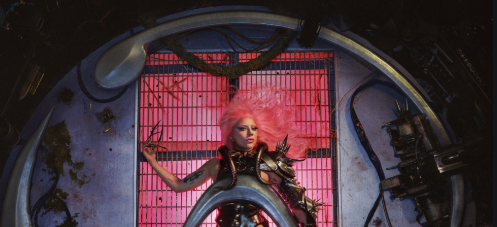
When Gaga Daily was asked about this in January of 2010, they stated it was just a rumor. "Alejandro" is the third single from The Fame Monster. Also throughout the episode, there were headlines stating, "ALEJANDRO MUSIC VIDEO PREVIEW". A preview of the music video for " Alejandro" was played in the background, with a mixture of the music videos of " Just Dance", " Poker Face", " LoveGame", " Paparazzi", " Bad Romance", and " Telephone". On June 1, 2010, Larry King Live had Lady Gaga as a guest star.It was featured on a commercial for the grand final of So You Think You Can Dance (Australia).The song was featured in the "Mulholland" episode of Melrose Place which aired on March 23, 2010."Alejandro" received the most votes for the summer anthem on Fuse: Where Music Loves, hosted a "Hottest Summer Songs Poll". Sarah Hajibagheri from The Times called the song "painful Latino warble a would-be Eurovision reject."

The song feels forced, and its Latin beat does not mesh well with Lady Gaga's style." Michael Hubbard of MusicOMH said that "'Alejandro' is brilliantly catchy, deceptively simple and wonderfully melancholy." Evan Sawdey from PopMatters said that Gaga's vocals sounded like those of Shakira's, in the chorus of the song. pop and hip-hop is currently drawing heavily from Europop, hi-NRG, and dance music." Chava Thomas from The Argonaut gave a negative review, saying "'Alejandro' is the one low point on The Fame Monster.

Scott Plagenhoef of Pitchfork Media noted that although "Alejandro" is an ABBA morph, "it comes off very modern, in part because U.S. Jon Dolan from Rolling Stone called it a "loving ABBA spoof". Ben Patashnik from NME called the song light-hearted. Mikael Wood of Los Angeles Times called it bubbly and compared the style to ABBA. Stephen Thomas Erlewine from Allmusic denoted the song as an "updated ABBA revision". Digital downloads also helped give it a top five entry in Hungary at #5, peaking higher than " Poker Face" had.Ĭhris Ryan from MTV called the song a "lush paean to a love that's 'hot like Mexico'." Bill Lamb from commented that the song "is a bit like Madonna's classic "La Isla Bonita" with a contemporary edge." Paul Lester from BBC felt that " moves at an Ace of Base pace." Sal Cinquemani from Slant Magazine also made an Ace of Base connection calling the song a homage to them. On November 25, 2009, "Alejandro" debuted on the UK Singles Chart at #75, along with many other tracks from The Fame Monster, due to high digital downloads. The song has a basic sequence of Bm–D–F♯m–Bm–D–F♯m as its chord progression. It is composed in the key of B minor with Gaga's vocal range spanning from F♯3 to A4. According to the sheet music published at by Sony/ATV Music Publishing, the song is set in the time signature of common time, with a moderate tempo of 80 beats per minute. The words are slurred in her mouth while consisting of an uplifting melody. The Ace of Base influences are prominent in the beats of the song, the vocals and the melody and lastly, in Gaga's non-English accent while singing the song. "Alejandro" is a mid-tempo song with heavy europop and disco influences, is an apparent homage to ABBA and Ace of Base. The lyrics talk about Gaga defending herself against a "harem" of Latin men and has a number of ABBA allusions, including a reference to their 1976 song "Fernando", which Gaga cited as one of her influences. In the song, 'Alejandro' represents Alexander McQueen, 'Fernando' represents Fernando Garibay, one of the producers she worked with on the album and for The Monster Ball Tour, and 'Roberto' represents Rob Fusari, an old producer and ex-boyfriend.

She confirmed this monster in an interview On the Record with Fuse. The monsters all take place in each song for example, "Alejandro" was influenced by her "Fear of Men Monster". In an interview, Gaga said that each of her songs written for The Fame Monster were all influenced by a monster. With this particular song, she stated "I'm saying goodbye to all my past boyfriends.". In fact, the song progression is not entirely unlike that of a traditional Csárdás, starting slowly at first and ending with a fast tempo. The violin solo played at the beginning of the song is an adaptation of the main melody of the only famous work of Vittorio Monti: Csárdás (or Czardas). The song was written while they were in Amsterdam and Ibiza during the summer of 2009 according to RedOne.


 0 kommentar(er)
0 kommentar(er)
